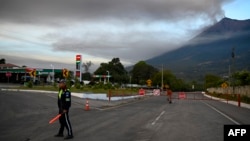The volcano sits about 16 kilometers (10 miles) from Antigua, the country's picturesque former capital and biggest tourist attraction.
Fuego erupts every four to five years on average. In 2018, an eruption sent rivers of lava pouring down its sides, devastating the village of San Miguel Los Lotes, killing 215 people and leaving a similar number missing.
Authorities are monitoring the latest eruption closely, and so far, no one has been evacuated, said Rodolfo Garcia, a civil protection spokesman.
"With what happened in 2018, now the authorities are already more alert and more active," said Jose Sul, another resident of Alotenango.
Locals saw a sudden expulsion of lava Saturday night that reddened the sky. "People here are used to experiencing this, and they look at it as normal," Demetrio Pamal, a 28-year-old Indigenous Mayan farmer, told AFP.
Many local families have a backpack ready with food, water, a flashlight and medicine so they can evacuate for up to three days at the drop of a hat.
Guatemala has two other active volcanoes -- Santiaguito in the west of the country and Pacaya in the south.
Fuego also adjoins the inactive Acatenango volcano — at 3,500 meters.
Unlike South America's Andean volcanoes, Guatemala's are not snow-capped because of Central America's warmer climate.
Central America has more than 100 volcanoes, many of which are wildly popular tourist attractions, even though they occasionally cause death and destruction.




